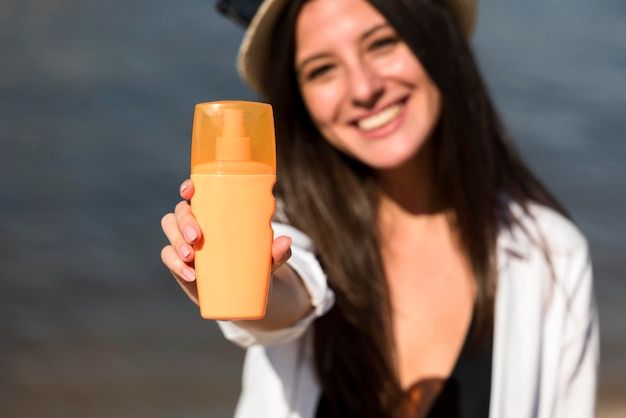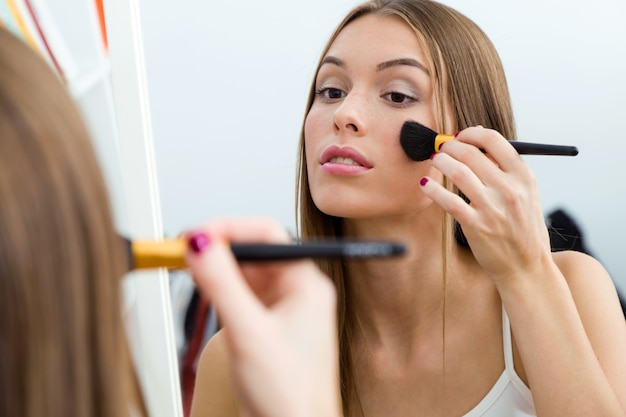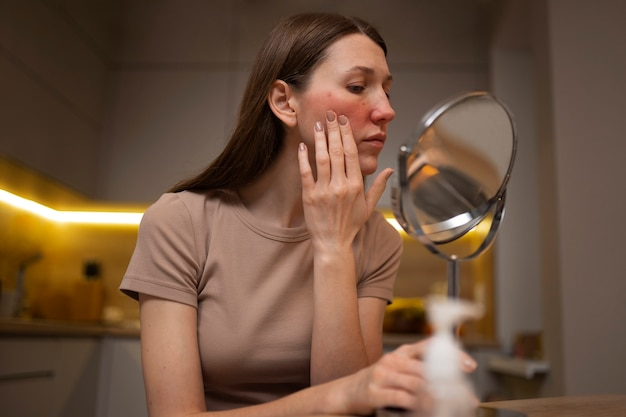The Power of Sunscreen: Why SPF is Essential Year-Round
The power of sunscreen and the importance of SPF cannot be overstated when it comes to protecting our skin from the damaging effects of the sun’s ultraviolet (UV) rays. SPF, or Sun Protection Factor, is a crucial factor to consider year-round, regardless of the season or weather conditions. In this blog, we will explore why SPF is essential for skin protection, the benefits it offers, and the significance of incorporating sunscreen into our daily skincare routine. Understanding the power of sunscreen and the role of SPF is key to maintaining healthy and radiant skin.

Importance of SPF
SPF, or Sun Protection Factor, is a measure of a sunscreen’s ability to protect the skin from harmful UVB rays. UVB rays are responsible for sunburns and are a significant contributor to skin cancer. By wearing sunscreen with a high SPF, we shield our skin from these harmful rays, preventing damage and reducing the risk of sunburn and skin cancer.
Sunscreen Benefits
Sunscreen offers a multitude of benefits that go beyond sunburn prevention. Here are a few reasons why sunscreen should be an essential part of your daily skincare routine:
Protection against UVA Rays: UVA rays penetrate deeper into the skin and are the primary cause of premature aging, wrinkles, and sunspots. The best sunscreen for face provides broad-spectrum protection, guarding against both UVA and UVB rays.
Prevents Skin Cancer: Regular use of sunscreen has been proven to lower the risk of developing skin cancer. It acts as a protective shield against the harmful effects of prolonged sun exposure, reducing the chances of malignant cell formation.
Maintains Even Skin Tone: Sunscreen helps prevent the formation of hyperpigmentation and uneven skin tone caused by the sun. By applying sunscreen daily, you can maintain a more even complexion and reduce the appearance of dark spots.
SPF for All Skin Types
No matter your skin type, sunscreen is crucial for everyone. Contrary to popular belief, individuals with darker skin tones are not immune to the sun’s harmful effects. While melanin does provide some natural protection, it is still essential to wear sunscreen to safeguard the skin from damage and maintain its overall health. Fortunately, there are sunscreens available for all skin types, including those specifically formulated for sensitive or acne-prone skin.
Sunscreen Application Tips
To ensure the maximum effectiveness of your sunscreen, follow these application tips:
- Opt for a sunscreen with an SPF of 30 or higher for adequate protection. Remember to check the label for the term “broad-spectrum” to ensure protection against both UVA and UVB rays.
- Use enough sunscreen to cover all exposed areas of the body. For the face, a quarter-sized amount is typically sufficient. Don’t forget often overlooked areas such as the ears, neck, and back of the hands.
- Sunscreen should be reapplied every two hours or more frequently if sweating or swimming. Even water-resistant sunscreens lose their effectiveness over time, so don’t skimp on reapplication.
Non-Greasy Sunscreen
For those who dislike the greasy feeling that some sunscreens can leave behind, fear not. Many brands now offer non-greasy sunscreen options that provide excellent protection without the oily residue. Look for oil-free or lightweight formulations that absorb quickly into the skin, providing a matte finish. These non-greasy sunscreens make it easier to incorporate sunscreen into your daily routine without compromising comfort.
Broad Spectrum Sunscreen for Comprehensive Protection
When choosing a sunscreen, opt for a broad spectrum formula. Broad spectrum sunscreens provide protection against both UVA and UVB rays. UVA rays are responsible for premature aging and can penetrate glass, while UVB rays are primarily responsible for sunburn. By using a broad spectrum sunscreen, you ensure comprehensive protection against both types of harmful UV rays.
Sunscreen for Sensitive Skin
If you have sensitive skin, finding the right sunscreen can be a challenge. Look for sunscreens specifically formulated for sensitive skin, as they are typically free from harsh chemicals and fragrances that can trigger irritation. These sunscreens are often labeled as “gentle” or “dermatologist-tested,” providing protection without causing discomfort or adverse reactions.
Waterproof Sunscreen for Long-lasting Protection
For those who enjoy swimming or participating in water activities, waterproof sunscreen is essential. These formulations are designed to adhere to the skin even when exposed to water or sweat, ensuring that the sun protection remains intact. Remember to reapply waterproof sunscreen as directed to maintain its effectiveness.
SPF Moisturizer for Daily Protection
Incorporating SPF into your daily skincare routine is vital for year-round protection. One way to achieve this is by using an SPF moisturizer. These products combine the benefits of hydration and sun protection, making it easier to ensure consistent daily use. Choose a moisturizer with an SPF of 30 or higher to provide adequate sun protection while keeping your skin nourished and moisturized.
Sunscreen for Oily Skin
If you have oily or acne-prone skin, you may be concerned that sunscreen will make your skin feel greasy or lead to breakouts. However, there are sunscreens specifically formulated for oily skin types. Look for lightweight, oil-free, or non-comedogenic options that won’t clog pores or contribute to excess oil production. These sunscreens offer the necessary protection without adding unwanted shine or causing skin issues.
Sunscreen and Aging
One of the most compelling reasons to incorporate sunscreen into your daily routine is its ability to combat signs of aging. Prolonged exposure to the sun’s harmful UV rays can accelerate the aging process, leading to wrinkles, fine lines, and age spots. By wearing sunscreen with a high SPF, you shield your skin from UVA rays, which are responsible for premature aging. Regular use of sunscreen helps maintain a youthful complexion and reduces the visible effects of sun damage over time.
The Benefits of Mineral Sunscreen
Mineral sunscreen is an excellent choice for those seeking natural and gentle sun protection. Unlike chemical sunscreens, which absorb UV rays, mineral sunscreens create a physical barrier on the skin’s surface, reflecting the sun’s rays. They typically contain zinc oxide or titanium dioxide as active ingredients. Mineral sunscreens offer several advantages, including:
- Mineral sunscreens provide broad-spectrum protection against both UVA and UVB rays, safeguarding your skin from sunburn and premature aging.
- Mineral sunscreens are generally well-tolerated by sensitive skin types. They are less likely to cause irritation or trigger allergic reactions, making them suitable for individuals with sensitivities or specific skin conditions.
Sunscreen for Acne-Prone Skin
Finding the right sunscreen for acne-prone skin can be challenging. The fear of clogged pores and breakouts often deters individuals with acne from using sunscreen altogether. However, there are non-comedogenic sunscreens specially formulated for acne-prone skin. These sunscreens are oil-free, lightweight, and won’t clog pores. Look for labels indicating “non-comedogenic” or “oil-free” to ensure that the sunscreen won’t exacerbate acne.
Sunscreen for Dry Skin
Dry skin requires extra care and hydration, and sunscreen should be a part of your daily skincare routine. Opt for a sunscreen that offers moisturizing properties to combat dryness. Look for ingredients like hyaluronic acid or glycerin, which help hydrate and replenish the skin. Sunscreens with a creamy or lotion-like consistency are generally more beneficial for dry skin, providing both sun protection and essential moisture.
Sunscreen and Skin Cancer Prevention
Skin cancer is a significant concern, and sunscreen plays a vital role in its prevention. Prolonged and unprotected sun exposure is a leading cause of skin cancer, including melanoma, the deadliest form of the disease. Applying sunscreen regularly reduces your risk by protecting your skin from the harmful effects of UV radiation. Make sure to choose a broad-spectrum sunscreen with an SPF of 30 or higher and reapply it as directed to maintain its effectiveness.
In conclusion, the power of sunscreen and the essentiality of SPF cannot be emphasized enough. Incorporating sunscreen into our daily skincare routine is vital for protecting our skin from the harmful effects of the sun’s UV rays, reducing the risk of skin cancer, preventing premature aging, and maintaining a healthy complexion. Whether it’s a sunny day at the beach or a cloudy winter afternoon, wearing broad-spectrum sunscreen with a suitable SPF is a non-negotiable step in safeguarding our skin year-round. By embracing the power of sunscreen and prioritizing its use, we invest in the long-term health and beauty of our skin. So, make SPF a daily habit and let the protective shield of sunscreen be your trusted ally on the journey to maintaining healthy, radiant skin.




